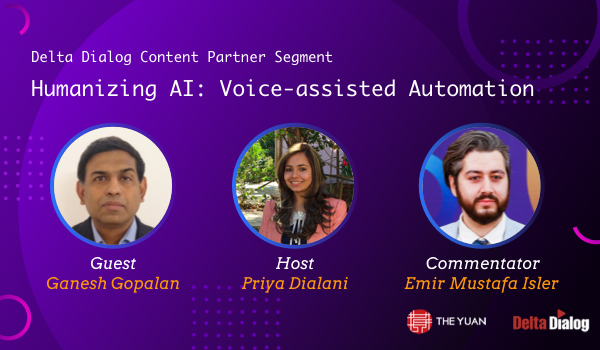
MUMBAI -
Humanizing AI: Voice-Assisted Automation
Voice AI, also known as voice-activated artificial intelligence or conversational AI, is a technology that enables machines to understand and interpret human speech. By using natural language processing (NLP) and machine learning (ML), voice AI can recognize and respond to human voice commands, allowing users to interact with technology using their voice. From virtual assistants like Siri and Alexa to chatbots and voice-enabled devices, voice AI has transformed the way we interact with technology, making it more intuitive, accessible, and user-friendly. With the rapid advancements in voice AI technology, we are seeing an increasing number of use cases in industries such as healthcare, finance, and education, where it is being used to improve efficiency, productivity, and customer service.
Making voice AI more conversational and natural is essential because it improves the user experience and helps to establish a more intuitive interaction between humans and machines. It enables users to interact with technology in a more natural way, using their voice and language, as they would with another human. This makes voice AI more accessible to a wider range of people, including those with limited mobility or visual impairments, and improves the overall usability of technology. Additionally, making voice AI more conversational and natural allows for more accurate and effective communication, leading to better outcomes and increased user satisfaction.
Voice AI faces several challenges, including accurate speech recognition. Accurately recognizing and understanding human speech can be difficult due to accents, dialects, and background noise. Contextual understanding is another challenge that requires a deep understanding of language and context to provide the correct response. Privacy and security concerns arise due to the constant listening of voice AI devices and applications, leading to potential hacking, misuse of recorded data, and unauthorized access to private information. Lack of standardization is another challenge, with different platforms and devices using different voice recognition technologies, making it difficult to integrate voice AI into different systems and applications. Lastly, while voice AI has come a long way in terms of natural language processing, achieving natural sounding responses that are less robotic and more human-like is a significant challenge for voice AI developers.
What’s in it for me? / Why should I care?
Voice AI technology is becoming increasingly pervasive in our daily lives, from virtual assistants like Siri and Alexa to smart home devices and even cars. As such, an average person should care about voice AI and its development because it has the potential to make our lives more convenient and accessible. Voice AI can help automate tasks, such as setting reminders, making calls, and controlling home appliances, which can save time and improve efficiency. Additionally, voice AI can make technology more accessible to individuals with limited mobility or visual impairments, allowing them to interact with technology in a more natural and intuitive way. As voice AI technology continues to advance, it has the potential to transform the way we interact with the world around us.
Companies like Gnani.ai are an important part of the development of voice AI because they are at the forefront of developing solutions to the challenges facing voice AI technology. By offering advanced Generative AI-powered solutions for speech recognition, natural language processing, and automated transcription, Gnani.ai is helping to improve the accuracy, efficiency, and usability of voice AI technology. This, in turn, can lead to better user experiences and increased adoption of voice AI technology. As more companies like Gnani.ai continue to innovate and push the boundaries of what's possible with voice AI, we can expect to see even more transformative applications of this technology in the future.
Further Reading:- The next trillion-dollar business: personal AI assistants - part 1
- AI Helps India Achieve Stable Mental Health
- Future healthcare will be more virtual, personalized, mobile





 789 views
789 views






